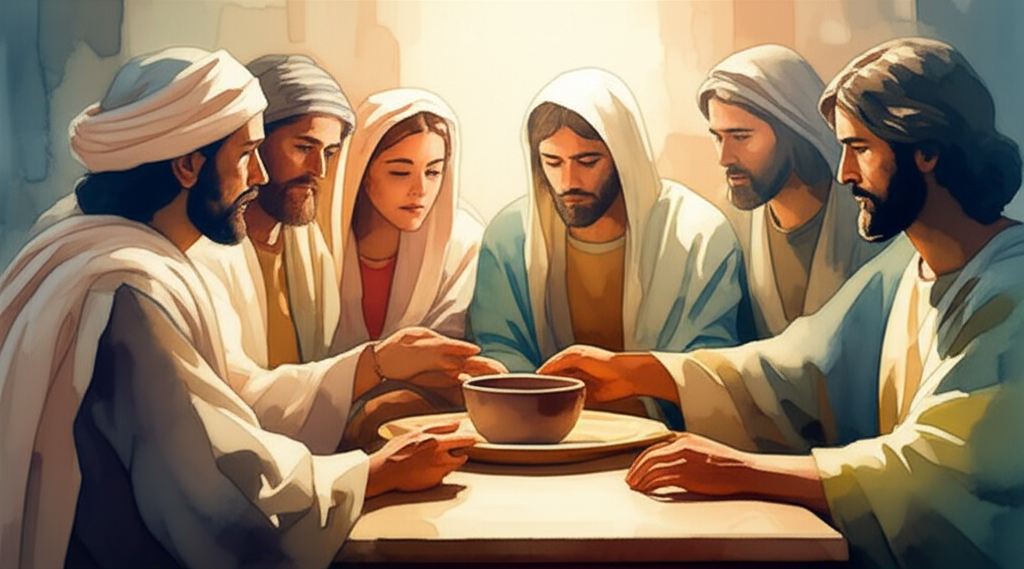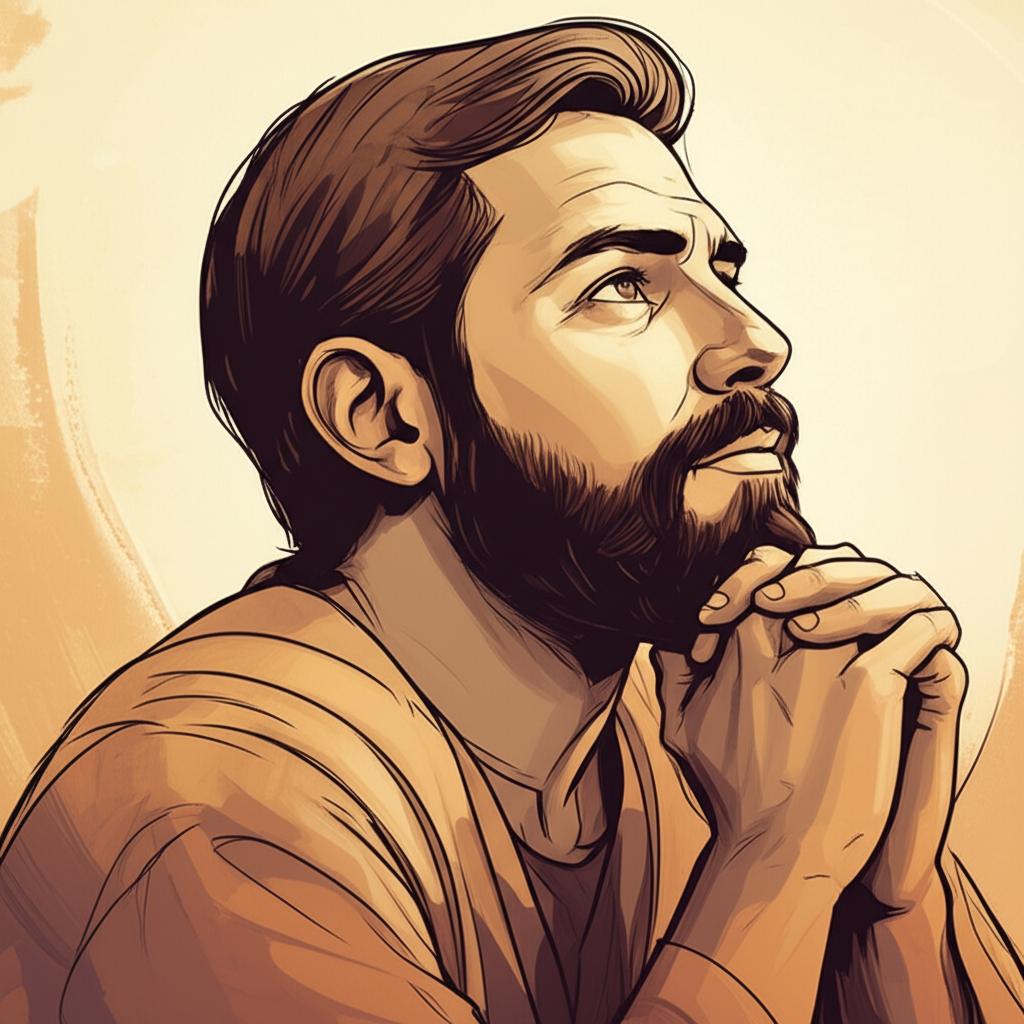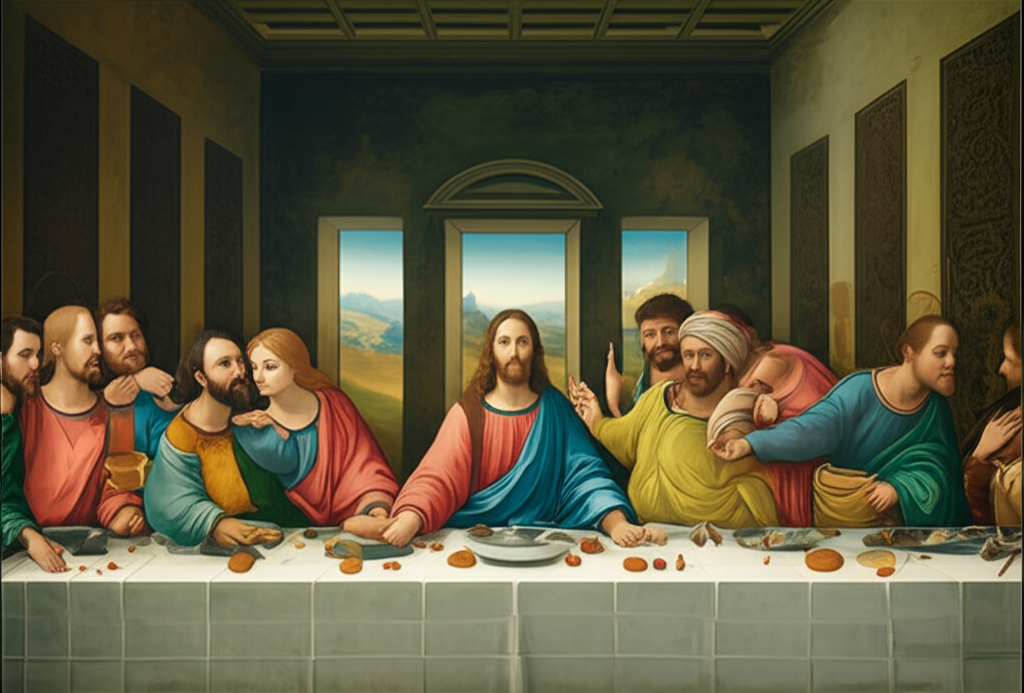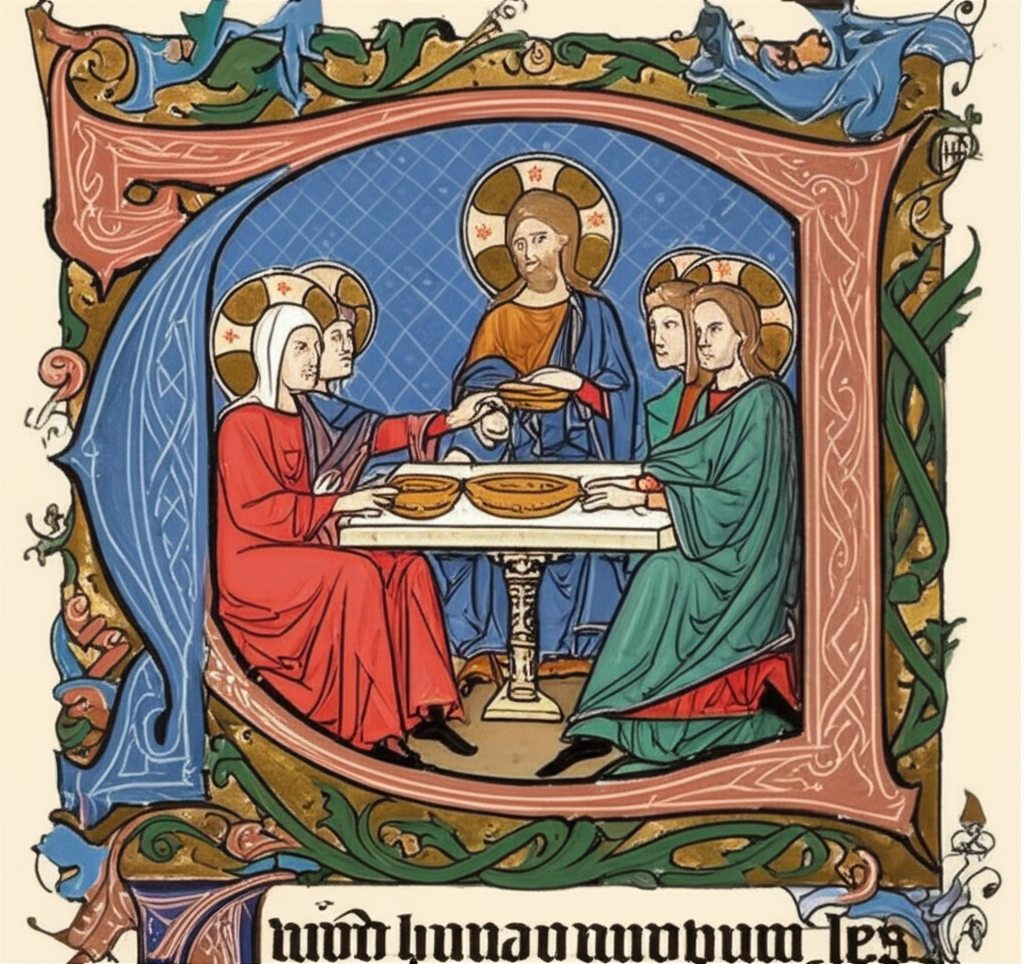1 Corinthians 11 meaning explained in AI Summary
This chapter tackles issues of worship and gender roles within the Corinthian church, focusing on head coverings, the Lord's Supper, and spiritual gifts.
Head Coverings (1-16): Paul addresses a controversy regarding head coverings for men and women during worship. He argues that men should pray and prophesy with uncovered heads, reflecting Christ's headship over man, while women should cover their heads as a symbol of submission to male authority, reflecting the created order. This passage is often debated and interpreted in various ways, with some focusing on cultural context and others emphasizing timeless principles.
The Lord's Supper (17-34): Paul criticizes the Corinthians for their divisive and disrespectful behavior during the Lord's Supper. He reminds them of the sacred nature of this meal, instituted by Jesus to remember his sacrifice. He condemns their practice of indulging in feasts while neglecting the poor and warns them that partaking in an unworthy manner brings judgment.
Spiritual Gifts (20-34): While not the central focus, this section connects to the previous one by highlighting the importance of unity and order within the church. Paul emphasizes that all spiritual gifts come from the same Spirit and should be used to build up the community, not for personal gain or division.
Key Themes:
- Order and Authority: Paul emphasizes the importance of order and authority within the church, particularly regarding gender roles.
- Unity and Love: He criticizes the Corinthians' divisive behavior and urges them to practice unity and love, especially during the Lord's Supper.
- Reverence and Respect: Paul stresses the sacred nature of worship and the need for reverence and respect, both for God and for one another.
Overall, 1 Corinthians 11 addresses practical issues within the Corinthian church, emphasizing the importance of order, unity, and reverence in worship and community life.
1 Corinthians 11 bible study ai commentary
1 Corinthians 11 addresses proper conduct in public worship, focusing on two specific issues causing disorder in the Corinthian church: the appropriate appearance of men and women during prayer and prophecy, and the selfish and divisive manner in which they were observing the Lord's Supper. Paul seeks to restore order, unity, and reverence by grounding their practices in theology, creation, and the direct commands of Christ.
1 Corinthians 11 Context
The city of Corinth was a bustling, cosmopolitan Roman colony. It was known for its wealth, social stratification, and diverse religious practices, including pagan temple worship. In this culture, a woman's veil or head covering was a sign of modesty, marital status, and respectability. For a woman to appear in public with her head uncovered could associate her with prostitutes or ecstatic pagan priestesses, bringing shame upon her family and husband. The early church meal, known as the "agape feast," which included the Lord's Supper, was being disrupted by these same social divisions. The wealthy members would arrive early and consume their lavish food, while poor members and slaves, arriving later, were left hungry, creating deep divisions within the church. Paul writes to correct these behaviors that undermine the gospel's witness.
1 Corinthians 11:2
Now I commend you because you remember me in everything and maintain the traditions even as I delivered them to you.
In-depth-analysis
- Paul begins with commendation to build rapport before correction.
- Word: "Traditions" (Greek:
paradoseis) refers to authoritative apostolic teaching passed down orally, not man-made rules. Paul establishes his instructions as part of this received, divine authority. This is the foundation of his subsequent arguments.
Bible references
- 2 Thessalonians 2:15: "...stand firm and hold to the traditions that you were taught by us..." (Authoritative Apostolic Teaching).
- 1 Corinthians 15:3: "For I delivered to you as of first importance what I also received..." (Paul as a conduit of tradition).
Cross references
2 Th 3:6 (command to hold tradition), 1 Tim 6:20 (guarding the deposit), Jude 1:3 (contending for the faith).
1 Corinthians 11:3
But I want you to understand that the head of every man is Christ, the head of a wife is her husband, and the head of Christ is God.
In-depth-analysis
- This verse establishes the theological principle for vv. 4-16: a divine order of relationships.
- Word: "Head" (Greek:
kephalē). It carries a dual meaning of both "source/origin" and "authority over." The context suggests Paul emphasizes relational order and source.- God is the source of Christ (in His incarnation).
- Christ is the source of man (in creation).
- Man is the source of woman (in the creation account, Gen 2:21-22).
- This is a principle of function and relationship, not of intrinsic value or essence. Christ is fully God, yet He submitted to the Father's authority in His earthly mission.
Bible references
- Ephesians 5:23: "For the husband is the head of the wife even as Christ is the head of the church..." (Clarifies husband-wife headship).
- Colossians 1:18: "And he is the head of the body, the church." (Christ's headship over the church).
- Genesis 2:21-22: "...he took one of his ribs... and the rib... he made into a woman." (Creation order: woman from man).
Cross references
Eph 1:22 (Christ head over all), Col 2:10 (Christ head of all rule), Joh 14:28 (Father is greater than I), Phil 2:5-8 (Christ's submission).
1 Corinthians 11:4-6
Every man who prays or prophesies with his head covered dishonors his head. But every wife who prays or prophesies with her head uncovered dishonors her head, since it is the same as if her head were shaven. For if a wife will not cover her head, then she should cut her hair short. But since it is disgraceful for a wife to have her hair cut short or shaven, let her cover her head.
In-depth-analysis
- Paul applies the
kephalēprinciple to worship practices. - A man covering his head would have symbolized submission in Greco-Roman culture, dishonoring his direct head, Christ.
- A woman uncovering her head publicly subverted the cultural norms of modesty and publicly dishonored her "head," her husband, implying she was not under his care and protection.
- The comparison to being "shaven" was a potent one. A shaven head was a sign of disgrace or prostitution in that culture. Paul's logic is: if you reject the symbol of your station (covering), you might as well adopt the ultimate symbol of shame (shaving).
- The passage affirms that women were praying and prophesying aloud in the Corinthian assembly, participating actively in worship.
Bible references
- Deuteronomy 21:12: A captive woman was to shave her head as a sign of mourning and change in status. (Cultural significance of shaved head).
- Numbers 5:18: An accused adulteress would have her head uncovered by the priest. (Uncovered head associated with shame).
Cross references
Deu 22:5 (maintaining distinctions), Eph 5:22-24 (wife submitting to husband), Acts 21:9 (women prophesying).
1 Corinthians 11:7
For a man ought not to cover his head, since he is the image and glory of God, but woman is the glory of man.
In-depth-analysis
- This is not a statement on ontology but on relational representation in worship.
- Man, created first, directly reflects God's "glory" (
doxa) in the created order. His headship in the family is meant to mirror God's authority. - Woman is the "glory of man" because she was created from man (Gen. 2) and completes him. In a marriage, her respectable conduct brings honor (glory) to him.
- This reflects a chain of glory: Woman brings glory to Man, who brings glory to Christ, who brings glory to God. It is about rightly representing this order in public worship.
Bible references
- Genesis 1:27: "So God created man in his own image, in the image of God he created him; male and female he created them." (Both are in God's image).
- Psalm 8:5: "You have crowned him with glory and honor." (Humanity's representative rule).
Cross references
Gen 5:1 (likeness of God), Heb 2:7 (crowned with glory).
1 Corinthians 11:8-9
For man was not made from woman, but woman from man. Neither was man created for woman, but woman for man.
In-depth-analysis
- Paul provides his second argument: the order of creation.
- He directly references the narrative of Genesis 2, where Eve was created from Adam's side and for him, as a "helper fit for him."
- This reinforces his point about function and relational order, not about essential worth. The sequence and purpose in creation have theological significance for Paul.
Bible references
- Genesis 2:18: "It is not good that the man should be alone; I will make him a helper fit for him." (Woman's purpose in creation).
- Genesis 2:21-23: "And the rib that the LORD God had taken from the man he made into a woman..." (Woman's origin from man).
Cross references
1 Tim 2:13 (Adam formed first, then Eve).
1 Corinthians 11:10
That is why a wife ought to have a symbol of authority on her head, because of the angels.
In-depth-analysis
- This is one of the most debated verses in the chapter.
- Word: "Authority" (Greek:
exousia). The covering is a sign of authority. Interpretations vary:- It is a symbol of the husband's authority over her.
- It is a symbol of her own God-given authority to pray and prophesy within the proper created order. By wearing it, she shows she is operating under God's ordained structure, and is thus free to participate.
- "Because of the angels": This is also highly debated.
- Angels are present in worship and are observers of God's order. Disorderly worship offends them (cf. Ps 138:1, Heb 1:14).
- It's a warning against tempting fallen angels, a possible allusion to Genesis 6:1-4 where the "sons of God" lusted after the "daughters of men." An uncovered head might be seen as a sign of rebellion or seduction.
- "Angels" could mean human "messengers" or visitors from other churches, for whom the Corinthians should set a good example.
Bible references
- Genesis 6:2: "...the sons of God saw that the daughters of man were attractive. And they took as their wives..." (Potential backdrop for fallen angel view).
- Hebrews 12:22: Believers come into the assembly of "...thousands of angels..." (Angelic presence in worship).
Cross references
Ps 138:1 (sing praises before the 'gods'/angels), Mat 18:10 (children's angels behold God's face), Eph 3:10 (church makes God's wisdom known to rulers/authorities in heavenly places).
1 Corinthians 11:11-12
Nevertheless, in the Lord woman is not independent of man nor man of woman; for as woman was made from man, so man is now born of woman. And all things are from God.
In-depth-analysis
- Paul immediately balances his statements on order with a powerful statement on mutual dependence and equality.
- This verse is crucial to prevent a misinterpretation of hierarchy as superiority.
- He counters his creation argument (woman from man) with a biological argument (man is born of woman).
- Ultimately, he grounds everything in God ("all things are from God"), who is the source of all, leveling any basis for pride or superiority of one sex over the other. The created order and mutual dependence both originate from God.
Bible references
- Galatians 3:28: "There is neither Jew nor Greek, there is neither slave nor free, there is no male and female, for you are all one in Christ Jesus." (Essential equality in Christ).
- Genesis 1:27: "...male and female he created them." (Simultaneous mention stressing unity).
Cross references
Eph 5:21 (submitting to one another), Gen 3:16 (curse affecting relationships).
1 Corinthians 11:13-16
Judge for yourselves: is it proper for a wife to pray to God with her head uncovered? Does not nature itself teach you that if a man wears long hair it is a disgrace for him, but if a woman has long hair, it is her glory? For her hair is given to her for a covering. If anyone is inclined to be contentious, we have no such practice, nor do the churches of God.
In-depth-analysis
- Paul shifts to two final arguments: an appeal to innate propriety ("nature") and universal church custom.
- "Nature" here likely refers to the prevailing cultural instincts and norms about hair length distinguishing the sexes. It wasn't a universal biological law (e.g., the Nazarite vow involved long hair for men), but it was a strong cultural differentiator in their context.
- "Hair is given... for a covering": This is not to say the hair is the covering, but that naturally long hair on a woman already points to the principle of covering and glory.
- His final statement is a powerful way to end the debate. He asserts that this practice is universal among the apostolic churches, effectively saying, "This is not up for debate; we are all in agreement on this."
Bible references
- Numbers 6:5: "He shall let the locks of hair of his head grow long." (Nazarite vow as a counter-example to "nature" being a rigid law).
Cross references
1 Cor 14:33-34 (appeal to practice of other churches).
Polemics
Many scholars see Paul's appeal to "nature" as rhetorical rather than scientific. He is using the Corinthians' own cultural assumptions to reinforce his theological point about gender distinction. Some interpret v.15 to mean that long hair replaces the need for a physical covering, but this contradicts the logic of the entire passage, which commands a covering for those who already have (culturally) long hair.
1 Corinthians 11:17-22
But in the following instructions I do not commend you, because when you come together it is not for the better but for the worse. For, in the first place, when you come together as a church, I hear that there are divisions among you... When you come together, it is not the Lord's supper that you eat. For in eating, each one goes ahead with his own meal. One goes hungry, another gets drunk. What! Do you not have houses to eat and drink in? Or do you despise the church of God and humiliate those who have nothing?
In-depth-analysis
- Paul transitions from order in appearance to order in action, with a sharp tone shift ("I do not commend you").
- The problem is "divisions" (
schismata). The unity of the church is being fractured. - Word: The "Lord's supper" (
kuriakon deipnon) was being invalidated by their conduct. It was supposed to be a unified, shared meal, but it had devolved into a private feast for the rich and a moment of shame for the poor. - The sin had two dimensions:
- Vertical: Disobedience to the spirit and command of the Lord's institution.
- Horizontal: Despising and humiliating fellow believers, the very body of Christ.
Bible references
- Acts 2:46: "And day by day... breaking bread in their homes, they received their food with glad and generous hearts." (Ideal of early church unity).
- James 2:1-4: "For if a man wearing a gold ring and fine clothing comes... and a poor man in shabby clothing also comes..." (Condemnation of showing partiality).
- Jude 1:12: "These are hidden reefs at your love feasts, as they feast with you without fear..." (Love feasts being corrupted).
Cross references
Gal 5:20 (divisions as works of the flesh), Rom 14:17 (kingdom of God not eating/drinking).
1 Corinthians 11:23-26
For I received from the Lord what I also delivered to you, that the Lord Jesus on the night when he was betrayed took bread, and when he had given thanks, he broke it, and said, “This is my body, which is for you. Do this in remembrance of me.” In the same way also he took the cup, after supper, saying, “This cup is the new covenant in my blood. Do this, as often as you drink it, in remembrance of me.” For as often as you eat this bread and drink the cup, you proclaim the Lord's death until he comes.
In-depth-analysis
- This is the earliest written account of the institution of the Lord's Supper.
- "Received from the Lord": Paul claims direct divine revelation for this teaching, giving it supreme authority.
- Word: "Remembrance" (
anamnēsis) is more than mental recall. It is a re-enactment, a making-present of the reality and significance of Christ's sacrifice. - The Supper has a dual focus:
- Past-ward Look: Remembering the sacrificial death of Christ ("my body... my blood").
- Forward-ward Proclamation: It is a visible sermon that "proclaims" the gospel message to believers, to one another, and to the world, looking forward to Christ's return ("until he comes").
Bible references
- Exodus 12:14: "This day shall be for you a memorial day, and you shall keep it as a feast to the LORD..." (Passover as a memorial).
- Matthew 26:26-29, Mark 14:22-25, Luke 22:14-20: The Gospel accounts of the Last Supper, which resonate strongly with Paul's account.
- Jeremiah 31:31: "...I will make a new covenant with the house of Israel..." (The prophesied New Covenant fulfilled in Christ's blood).
Cross references
Heb 9:15-22 (new covenant in blood), John 6:53-56 (eating flesh and drinking blood).
1 Corinthians 11:27-29
Whoever, therefore, eats the bread or drinks the cup of the Lord in an unworthy manner will be guilty concerning the body and blood of the Lord. Let a person examine himself, then, and so eat of the bread and drink of the cup. For anyone who eats and drinks without discerning the body eats and drinks judgment on himself.
In-depth-analysis
- "Unworthy manner" does not mean being sinlessly perfect, but participating in a way that contradicts the meaning of the Supper—specifically, with disunity, selfishness, and disregard for others.
- "Examine himself": This is a call to introspect one's relationship with God and, crucially in this context, with fellow members of the church.
- Word: "Discerning the body" (
diakrinōn to sōma). This is the key failure.- It involves failing to recognize the sacredness of the elements representing Christ's physical body.
- Contextually, it primarily means failing to recognize the church as Christ's body, by creating division and humiliating its poorer members. The two meanings are inseparable.
- Word: "Judgment" (
krima) is better translated as 'discernment' or 'divine discipline', not necessarily eternal damnation.
Bible references
- Matthew 5:23-24: "So if you are offering your gift at the altar and there remember that your brother has something against you... first be reconciled..." (Importance of horizontal reconciliation for worship).
- 2 Corinthians 13:5: "Examine yourselves, to see whether you are in the faith." (Call for self-examination).
Cross references
1 Joh 4:20 (love for brother reflects love for God), Gal 6:4 (test your own work), Heb 10:29 (profaning the blood of the covenant).
1 Corinthians 11:30-32
That is why many of you are weak and ill, and some have fallen asleep. But if we judged ourselves truly, we would not be judged. But when we are judged by the Lord, we are disciplined so that we may not be condemned along with the world.
In-depth-analysis
- The profane participation in the Supper had real, physical consequences: sickness ("weak and ill") and even death ("fallen asleep," a common Christian euphemism for death).
- This is presented as the Lord's "judgment" (
krima) or "discipline" (paideuometha). - The purpose of this severe discipline is restorative, not punitive. It is to chasten the believer so that they may not be condemned eternally along with the unbelieving world. God disciplines His children out of love to bring them to repentance.
Bible references
- Hebrews 12:5-6: "...the Lord disciplines the one he loves, and chastises every son whom he receives." (Purpose of divine discipline).
- 1 John 5:16: "There is a sin that leads to death..." (Possibility of physical death as a consequence of sin).
Cross references
Pro 3:11-12 (do not despise the Lord's discipline), Acts 5:1-11 (Ananias and Sapphira).
1 Corinthians 11:33-34
So then, my brothers, when you come together to eat, wait for one another. If anyone is hungry, let him eat at home—so that when you come together it will not be for judgment. About the other things I will give directions when I come.
In-depth-analysis
- Paul concludes with a simple, practical solution to the problem.
- "Wait for one another": This command directly addresses the selfish individualism and restores the communal nature of the meal.
- "Eat at home": This distinguishes the sacred Supper from a common meal to satisfy hunger. It removes the opportunity for gluttony and drunkenness, ensuring the focus is on the Lord.
- The goal is to gather for blessing, not judgment.
Bible references
- Romans 12:10: "Love one another with brotherly affection. Outdo one another in showing honor." (The spirit that should characterize their gathering).
- Galatians 5:13: "...through love serve one another." (Practical application of love).
Cross references
2 Pe 1:7 (brotherly affection), Phil 2:3-4 (count others more significant).
1 Corinthians Chapter 11 analysis
- The Unifying Theme of "Body": A powerful thread connects the chapter's two seemingly separate sections. The first half deals with honoring the "head" of the physical body as a sign of respecting God's created order. The second half deals with "discerning the body" of Christ—both in the elements and, more critically, in the church community. Dishonoring the church body through division is as grave a sin as dishonoring the created order in worship.
- Glory and Shame: The concepts of "glory" (
doxa) and "shame/dishonor" (aischynō) are central to both sections. In the first, an uncovered head brings shame to a woman's symbolic head. In the second, humiliating the poor brings shame upon the church of God. Proper worship brings glory to God; disorderly worship brings shame. - Principle vs. Application: In the head-covering debate, a key interpretive task is to distinguish the timeless theological principle (God's order and gender distinction) from the culturally specific application (a physical head covering). Many scholars argue the principle is trans-cultural, while the application was contextual.
- The Lord's Supper as a Gospel Proclamation: Paul's account firmly establishes Communion not just as a memorial but as an active, ongoing proclamation of the gospel's core: the substitutionary death of Christ. This proclamation looks backward in memory and forward in hope ("until he comes").
1 Corinthians 11 summary
Paul corrects two significant problems in the Corinthian church's worship. First, he instructs men and women on proper conduct in prayer and prophecy, using the principle of divine headship to argue for gender-appropriate appearances that honor God's created order and cultural propriety. Second, he harshly rebukes the church for their selfish and divisive observance of the Lord's Supper, reminding them of its true meaning as a unified, solemn proclamation of Christ's death. He warns that failing to "discern the body" of Christ—both the elements and the church itself—brings divine discipline, and he commands them to practice mutual respect and unity.
1 Corinthians 11 AI Image Audio and Video









1 Corinthians chapter 11 kjv
- 1 Be ye followers of me, even as I also am of Christ.
- 2 Now I praise you, brethren, that ye remember me in all things, and keep the ordinances, as I delivered them to you.
- 3 But I would have you know, that the head of every man is Christ; and the head of the woman is the man; and the head of Christ is God.
- 4 Every man praying or prophesying, having his head covered, dishonoureth his head.
- 5 But every woman that prayeth or prophesieth with her head uncovered dishonoureth her head: for that is even all one as if she were shaven.
- 6 For if the woman be not covered, let her also be shorn: but if it be a shame for a woman to be shorn or shaven, let her be covered.
- 7 For a man indeed ought not to cover his head, forasmuch as he is the image and glory of God: but the woman is the glory of the man.
- 8 For the man is not of the woman: but the woman of the man.
- 9 Neither was the man created for the woman; but the woman for the man.
- 10 For this cause ought the woman to have power on her head because of the angels.
- 11 Nevertheless neither is the man without the woman, neither the woman without the man, in the Lord.
- 12 For as the woman is of the man, even so is the man also by the woman; but all things of God.
- 13 Judge in yourselves: is it comely that a woman pray unto God uncovered?
- 14 Doth not even nature itself teach you, that, if a man have long hair, it is a shame unto him?
- 15 But if a woman have long hair, it is a glory to her: for her hair is given her for a covering.
- 16 But if any man seem to be contentious, we have no such custom, neither the churches of God.
- 17 Now in this that I declare unto you I praise you not, that ye come together not for the better, but for the worse.
- 18 For first of all, when ye come together in the church, I hear that there be divisions among you; and I partly believe it.
- 19 For there must be also heresies among you, that they which are approved may be made manifest among you.
- 20 When ye come together therefore into one place, this is not to eat the Lord's supper.
- 21 For in eating every one taketh before other his own supper: and one is hungry, and another is drunken.
- 22 What? have ye not houses to eat and to drink in? or despise ye the church of God, and shame them that have not? What shall I say to you? shall I praise you in this? I praise you not.
- 23 For I have received of the Lord that which also I delivered unto you, That the Lord Jesus the same night in which he was betrayed took bread:
- 24 And when he had given thanks, he brake it, and said, Take, eat: this is my body, which is broken for you: this do in remembrance of me.
- 25 After the same manner also he took the cup, when he had supped, saying, This cup is the new testament in my blood: this do ye, as oft as ye drink it, in remembrance of me.
- 26 For as often as ye eat this bread, and drink this cup, ye do shew the Lord's death till he come.
- 27 Wherefore whosoever shall eat this bread, and drink this cup of the Lord, unworthily, shall be guilty of the body and blood of the Lord.
- 28 But let a man examine himself, and so let him eat of that bread, and drink of that cup.
- 29 For he that eateth and drinketh unworthily, eateth and drinketh damnation to himself, not discerning the Lord's body.
- 30 For this cause many are weak and sickly among you, and many sleep.
- 31 For if we would judge ourselves, we should not be judged.
- 32 But when we are judged, we are chastened of the Lord, that we should not be condemned with the world.
- 33 Wherefore, my brethren, when ye come together to eat, tarry one for another.
- 34 And if any man hunger, let him eat at home; that ye come not together unto condemnation. And the rest will I set in order when I come.
1 Corinthians chapter 11 nkjv
- 1 Imitate me, just as I also imitate Christ.
- 2 Now I praise you, brethren, that you remember me in all things and keep the traditions just as I delivered them to you.
- 3 But I want you to know that the head of every man is Christ, the head of woman is man, and the head of Christ is God.
- 4 Every man praying or prophesying, having his head covered, dishonors his head.
- 5 But every woman who prays or prophesies with her head uncovered dishonors her head, for that is one and the same as if her head were shaved.
- 6 For if a woman is not covered, let her also be shorn. But if it is shameful for a woman to be shorn or shaved, let her be covered.
- 7 For a man indeed ought not to cover his head, since he is the image and glory of God; but woman is the glory of man.
- 8 For man is not from woman, but woman from man.
- 9 Nor was man created for the woman, but woman for the man.
- 10 For this reason the woman ought to have a symbol of authority on her head, because of the angels.
- 11 Nevertheless, neither is man independent of woman, nor woman independent of man, in the Lord.
- 12 For as woman came from man, even so man also comes through woman; but all things are from God.
- 13 Judge among yourselves. Is it proper for a woman to pray to God with her head uncovered?
- 14 Does not even nature itself teach you that if a man has long hair, it is a dishonor to him?
- 15 But if a woman has long hair, it is a glory to her; for her hair is given to her for a covering.
- 16 But if anyone seems to be contentious, we have no such custom, nor do the churches of God.
- 17 Now in giving these instructions I do not praise you, since you come together not for the better but for the worse.
- 18 For first of all, when you come together as a church, I hear that there are divisions among you, and in part I believe it.
- 19 For there must also be factions among you, that those who are approved may be recognized among you.
- 20 Therefore when you come together in one place, it is not to eat the Lord's Supper.
- 21 For in eating, each one takes his own supper ahead of others; and one is hungry and another is drunk.
- 22 What! Do you not have houses to eat and drink in? Or do you despise the church of God and shame those who have nothing? What shall I say to you? Shall I praise you in this? I do not praise you.
- 23 For I received from the Lord that which I also delivered to you: that the Lord Jesus on the same night in which He was betrayed took bread;
- 24 and when He had given thanks, He broke it and said, "Take, eat; this is My body which is broken for you; do this in remembrance of Me."
- 25 In the same manner He also took the cup after supper, saying, "This cup is the new covenant in My blood. This do, as often as you drink it, in remembrance of Me."
- 26 For as often as you eat this bread and drink this cup, you proclaim the Lord's death till He comes.
- 27 Therefore whoever eats this bread or drinks this cup of the Lord in an unworthy manner will be guilty of the body and blood of the Lord.
- 28 But let a man examine himself, and so let him eat of the bread and drink of the cup.
- 29 For he who eats and drinks in an unworthy manner eats and drinks judgment to himself, not discerning the Lord's body.
- 30 For this reason many are weak and sick among you, and many sleep.
- 31 For if we would judge ourselves, we would not be judged.
- 32 But when we are judged, we are chastened by the Lord, that we may not be condemned with the world.
- 33 Therefore, my brethren, when you come together to eat, wait for one another.
- 34 But if anyone is hungry, let him eat at home, lest you come together for judgment. And the rest I will set in order when I come.
1 Corinthians chapter 11 niv
- 1 Follow my example, as I follow the example of Christ.
- 2 I praise you for remembering me in everything and for holding to the traditions just as I passed them on to you.
- 3 But I want you to realize that the head of every man is Christ, and the head of the woman is man, and the head of Christ is God.
- 4 Every man who prays or prophesies with his head covered dishonors his head.
- 5 But every woman who prays or prophesies with her head uncovered dishonors her head?it is the same as having her head shaved.
- 6 For if a woman does not cover her head, she might as well have her hair cut off; but if it is a disgrace for a woman to have her hair cut off or her head shaved, then she should cover her head.
- 7 A man ought not to cover his head, since he is the image and glory of God; but woman is the glory of man.
- 8 For man did not come from woman, but woman from man;
- 9 neither was man created for woman, but woman for man.
- 10 It is for this reason that a woman ought to have authority over her own head, because of the angels.
- 11 Nevertheless, in the Lord woman is not independent of man, nor is man independent of woman.
- 12 For as woman came from man, so also man is born of woman. But everything comes from God.
- 13 Judge for yourselves: Is it proper for a woman to pray to God with her head uncovered?
- 14 Does not the very nature of things teach you that if a man has long hair, it is a disgrace to him,
- 15 but that if a woman has long hair, it is her glory? For long hair is given to her as a covering.
- 16 If anyone wants to be contentious about this, we have no other practice?nor do the churches of God.
- 17 In the following directives I have no praise for you, for your meetings do more harm than good.
- 18 In the first place, I hear that when you come together as a church, there are divisions among you, and to some extent I believe it.
- 19 No doubt there have to be differences among you to show which of you have God's approval.
- 20 So then, when you come together, it is not the Lord's Supper you eat,
- 21 for when you are eating, some of you go ahead with your own private suppers. As a result, one person remains hungry and another gets drunk.
- 22 Don't you have homes to eat and drink in? Or do you despise the church of God by humiliating those who have nothing? What shall I say to you? Shall I praise you? Certainly not in this matter!
- 23 For I received from the Lord what I also passed on to you: The Lord Jesus, on the night he was betrayed, took bread,
- 24 and when he had given thanks, he broke it and said, "This is my body, which is for you; do this in remembrance of me."
- 25 In the same way, after supper he took the cup, saying, "This cup is the new covenant in my blood; do this, whenever you drink it, in remembrance of me."
- 26 For whenever you eat this bread and drink this cup, you proclaim the Lord's death until he comes.
- 27 So then, whoever eats the bread or drinks the cup of the Lord in an unworthy manner will be guilty of sinning against the body and blood of the Lord.
- 28 Everyone ought to examine themselves before they eat of the bread and drink from the cup.
- 29 For those who eat and drink without discerning the body of Christ eat and drink judgment on themselves.
- 30 That is why many among you are weak and sick, and a number of you have fallen asleep.
- 31 But if we were more discerning with regard to ourselves, we would not come under such judgment.
- 32 Nevertheless, when we are judged in this way by the Lord, we are being disciplined so that we will not be finally condemned with the world.
- 33 So then, my brothers and sisters, when you gather to eat, you should all eat together.
- 34 Anyone who is hungry should eat something at home, so that when you meet together it may not result in judgment. And when I come I will give further directions.
1 Corinthians chapter 11 esv
- 1 Be imitators of me, as I am of Christ.
- 2 Now I commend you because you remember me in everything and maintain the traditions even as I delivered them to you.
- 3 But I want you to understand that the head of every man is Christ, the head of a wife is her husband, and the head of Christ is God.
- 4 Every man who prays or prophesies with his head covered dishonors his head,
- 5 but every wife who prays or prophesies with her head uncovered dishonors her head, since it is the same as if her head were shaven.
- 6 For if a wife will not cover her head, then she should cut her hair short. But since it is disgraceful for a wife to cut off her hair or shave her head, let her cover her head.
- 7 For a man ought not to cover his head, since he is the image and glory of God, but woman is the glory of man.
- 8 For man was not made from woman, but woman from man.
- 9 Neither was man created for woman, but woman for man.
- 10 That is why a wife ought to have a symbol of authority on her head, because of the angels.
- 11 Nevertheless, in the Lord woman is not independent of man nor man of woman;
- 12 for as woman was made from man, so man is now born of woman. And all things are from God.
- 13 Judge for yourselves: is it proper for a wife to pray to God with her head uncovered?
- 14 Does not nature itself teach you that if a man wears long hair it is a disgrace for him,
- 15 but if a woman has long hair, it is her glory? For her hair is given to her for a covering.
- 16 If anyone is inclined to be contentious, we have no such practice, nor do the churches of God.
- 17 But in the following instructions I do not commend you, because when you come together it is not for the better but for the worse.
- 18 For, in the first place, when you come together as a church, I hear that there are divisions among you. And I believe it in part,
- 19 for there must be factions among you in order that those who are genuine among you may be recognized.
- 20 When you come together, it is not the Lord's supper that you eat.
- 21 For in eating, each one goes ahead with his own meal. One goes hungry, another gets drunk.
- 22 What! Do you not have houses to eat and drink in? Or do you despise the church of God and humiliate those who have nothing? What shall I say to you? Shall I commend you in this? No, I will not.
- 23 For I received from the Lord what I also delivered to you, that the Lord Jesus on the night when he was betrayed took bread,
- 24 and when he had given thanks, he broke it, and said, "This is my body, which is for you. Do this in remembrance of me."
- 25 In the same way also he took the cup, after supper, saying, "This cup is the new covenant in my blood. Do this, as often as you drink it, in remembrance of me."
- 26 For as often as you eat this bread and drink the cup, you proclaim the Lord's death until he comes.
- 27 Whoever, therefore, eats the bread or drinks the cup of the Lord in an unworthy manner will be guilty concerning the body and blood of the Lord.
- 28 Let a person examine himself, then, and so eat of the bread and drink of the cup.
- 29 For anyone who eats and drinks without discerning the body eats and drinks judgment on himself.
- 30 That is why many of you are weak and ill, and some have died.
- 31 But if we judged ourselves truly, we would not be judged.
- 32 But when we are judged by the Lord, we are disciplined so that we may not be condemned along with the world.
- 33 So then, my brothers, when you come together to eat, wait for one another ?
- 34 if anyone is hungry, let him eat at home ? so that when you come together it will not be for judgment. About the other things I will give directions when I come.
1 Corinthians chapter 11 nlt
- 1 And you should imitate me, just as I imitate Christ.
- 2 I am so glad that you always keep me in your thoughts, and that you are following the teachings I passed on to you.
- 3 But there is one thing I want you to know: The head of every man is Christ, the head of woman is man, and the head of Christ is God.
- 4 A man dishonors his head if he covers his head while praying or prophesying.
- 5 But a woman dishonors her head if she prays or prophesies without a covering on her head, for this is the same as shaving her head.
- 6 Yes, if she refuses to wear a head covering, she should cut off all her hair! But since it is shameful for a woman to have her hair cut or her head shaved, she should wear a covering.
- 7 A man should not wear anything on his head when worshiping, for man is made in God's image and reflects God's glory. And woman reflects man's glory.
- 8 For the first man didn't come from woman, but the first woman came from man.
- 9 And man was not made for woman, but woman was made for man.
- 10 For this reason, and because the angels are watching, a woman should wear a covering on her head to show she is under authority.
- 11 But among the Lord's people, women are not independent of men, and men are not independent of women.
- 12 For although the first woman came from man, every other man was born from a woman, and everything comes from God.
- 13 Judge for yourselves. Is it right for a woman to pray to God in public without covering her head?
- 14 Isn't it obvious that it's disgraceful for a man to have long hair?
- 15 And isn't long hair a woman's pride and joy? For it has been given to her as a covering.
- 16 But if anyone wants to argue about this, I simply say that we have no other custom than this, and neither do God's other churches.
- 17 But in the following instructions, I cannot praise you. For it sounds as if more harm than good is done when you meet together.
- 18 First, I hear that there are divisions among you when you meet as a church, and to some extent I believe it.
- 19 But, of course, there must be divisions among you so that you who have God's approval will be recognized!
- 20 When you meet together, you are not really interested in the Lord's Supper.
- 21 For some of you hurry to eat your own meal without sharing with others. As a result, some go hungry while others get drunk.
- 22 What? Don't you have your own homes for eating and drinking? Or do you really want to disgrace God's church and shame the poor? What am I supposed to say? Do you want me to praise you? Well, I certainly will not praise you for this!
- 23 For I pass on to you what I received from the Lord himself. On the night when he was betrayed, the Lord Jesus took some bread
- 24 and gave thanks to God for it. Then he broke it in pieces and said, "This is my body, which is given for you. Do this in remembrance of me."
- 25 In the same way, he took the cup of wine after supper, saying, "This cup is the new covenant between God and his people ? an agreement confirmed with my blood. Do this in remembrance of me as often as you drink it."
- 26 For every time you eat this bread and drink this cup, you are announcing the Lord's death until he comes again.
- 27 So anyone who eats this bread or drinks this cup of the Lord unworthily is guilty of sinning against the body and blood of the Lord.
- 28 That is why you should examine yourself before eating the bread and drinking the cup.
- 29 For if you eat the bread or drink the cup without honoring the body of Christ, you are eating and drinking God's judgment upon yourself.
- 30 That is why many of you are weak and sick and some have even died.
- 31 But if we would examine ourselves, we would not be judged by God in this way.
- 32 Yet when we are judged by the Lord, we are being disciplined so that we will not be condemned along with the world.
- 33 So, my dear brothers and sisters, when you gather for the Lord's Supper, wait for each other.
- 34 If you are really hungry, eat at home so you won't bring judgment upon yourselves when you meet together. I'll give you instructions about the other matters after I arrive.
- Bible Book of 1 Corinthians
- 1 Greeting
- 2 Proclaiming Christ Crucified
- 3 Divisions in the Church
- 4 The Ministry of Apostles
- 5 Sexual Immorality Defiles the Church
- 6 Lawsuits Against Believers
- 7 Paul on Marriage
- 8 Wisdom in Meat Sacrified to Idols
- 9 Paul Surrenders His Rights
- 10 Warning Against Idolatry
- 11 Imitate me as I imitate Christ
- 12 Spiritual gifts of the Holy Spirit
- 13 If I have not Love the greatest
- 14 Prophecy and Tongues
- 15 Good news of Jesus rose from the dead
- 16 The Collection for the Saints